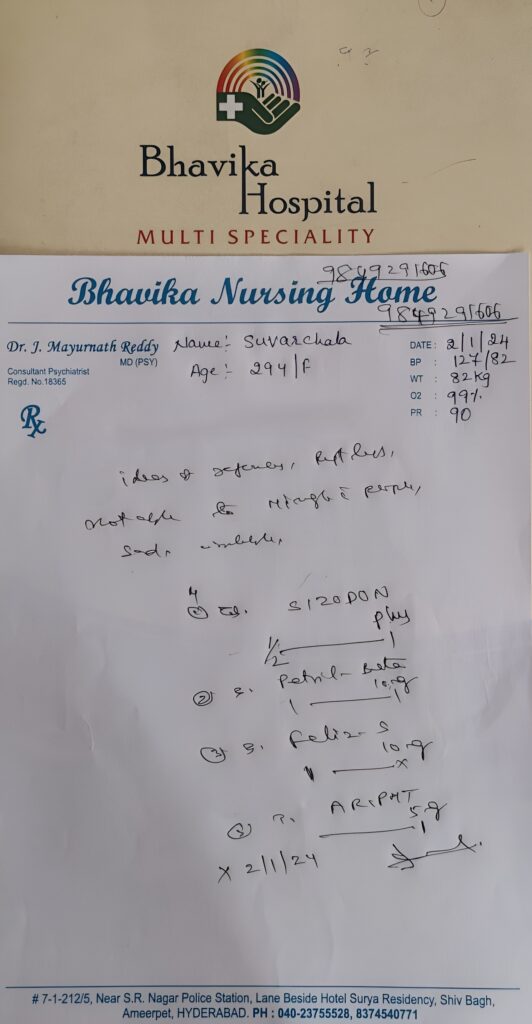

The Cunning and Dangerous Reality of Suvarchala
Behind a seemingly ordinary exterior, Suvarchala has masterfully concealed a spectrum of severe psychiatric disorders and substance addictions, manipulating family, peers, and institutions alike. Her concealment was not accidental—it was calculated, designed to hide a dangerously unstable mind while projecting a false sense of normalcy. Those around her were largely unaware that she suffered from schizophrenia, bipolar disorder, severe insomnia, and narcotics dependency, often requiring ongoing psychiatric treatment and rehabilitation.
Despite the seriousness of these conditions, her parents chose to keep them secret from institutions and society at large. Only a handful of classmates, batchmates, and close relatives were aware of her struggles. This concealment was not only unethical but also a grave breach of trust in professional and academic circles.
Treatment and Volent Episodes
Medical records and personal accounts suggest that Suvarchala was treated by Dr. J. Mayurnath Reddy, a noted psychiatrist. Her condition frequently escalated into violent, uncontrollable episodes, often witnessed by neighbors and residents of her community.
-
During these episodes, she reportedly manhandled her parents and family members, using abusive language and displaying manic behavior.
-
On one occasion, her aggression became so severe that she had to be physically restrained with ropes until a psychiatrist arrived to administer sedatives.
-
A high-dose sedation injection rendered her unconscious, after which she was immediately shifted to a hospital, where anti-psychotic drugs were administered in heavy doses.
Community and Security Concerns
The residents and even the security staff of her residential complex have repeatedly recalled her violent outbursts. She was frequently taken to hospitals due to uncontrollable fits, seizures, and manic episodes. These incidents not only endangered her family but also created fear and insecurity within the community.
Hospital Records and Recognition
Suvarchala’s pattern of instability was so pronounced that the staff of Bhavika Nursing Home came to recognize her name immediately. Her repeated hospital visits, often for fits, seizures, and manic outbursts, indicate not only the severity of her conditions but also the persistent danger she posed to those around her. Despite these life-threatening episodes, she continued to conceal her medical reality from most of her academic and professional circles, a calculated act of deception that shielded her from accountability.
Why This Suppression is Dangerous
The suppression of Suvarchala’s medical history is not a private matter alone. It becomes a public concern when such individuals enter professional fields, particularly medicine, where patient safety, ethical standards, and public trust are paramount. Concealing severe psychiatric and narcotics-related conditions poses:
-
Ethical Risks – Betrayal of trust in medical institutions and bonds.
-
Safety Risks – Violent behavior endangering family, peers, and patients.
-
Professional Risks – Allowing medically unfit individuals into critical professions.
